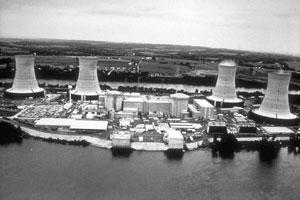Three Mile Island

I and my two compatriots are the subject of a story that's getting some wide recognition lately as a result of the 30th anniversary of the Three Mile Island accident. Sue Sturgis wrote the story for Facing South and it has since been published in a variety of online resources including Wikipedia, Alternet and Common Dreams. Links below.
It was April Fool's Day, 1979—30 years ago this month—when Randall Thompson first set foot inside the Three Mile Island nuclear power plant near Middletown, Pa. Just four days earlier, in the early morning hours of March 28, a relatively minor problem in the plant's Unit 2 reactor sparked a series of mishaps that led to the meltdown of almost half the uranium fuel and uncontrolled releases of radiation into the air and surrounding Susquehanna River.
It was the single worst disaster ever to befall the U.S. nuclear power industry, and Thompson was hired as a health physics technician to go inside the plant and find out how dangerous the situation was. He spent 28 days monitoring radiation releases. Today, his story about what he witnessed at Three Mile Island is being brought to the public in detail for the first time; and his version of what happened during that time, supported by a growing body of other scientific evidence, contradicts the official U.S. government story that the Three Mile Island accident posed no threat to the public.
"What happened at TMI was a whole lot worse than what has been reported," Thompson told Facing South. "Hundreds of times worse."
Wikipedia
Alternet
Common Dreams
Indy Week
Oxdown Gazette/Firedog Lake
Undernews Progressive Review
concerned citizens for Nuclear Safety
Online Educational Resources
Millinium Ark

The story is now getting some attention on the air waves as well. David Bear, whom we enlisted to help investigate the accident during the first month following the meltdown, appeared Friday, April 24th, on San Francisco's largest News/Talk radio station KGO AM 810 with host Pat Thurston. You can listen to the one hour audio HERE.
It's a great interview and David covers a lot of ground in the short time he had. It also includes a call from a retired nuclear aircraft carrier Captain who challenged David, only to be handed the cruel reality of the difference between military and commercial reactors.


8 Comments:
So proud of you and Joy.
Thank you.
Self-promotion, self-serving BS. Go ahead, kill nuclear power. Then go apologize to all the Pacific Islanders who you are consigning to losing their land due to rising waters from CO2 overload. Apologize in advance to the future generations who will struggle to survive in a world where most of the established species died off due to changing climate conditions which were too fast to migrate from.
Renewables? By when and how much? The numbers just don't add up. Our choices for baseload capacity are nuclear and fossil fuels - period. But you and the rest of the anti-nukes run around like little children screaming about how scary teh nucular is while coal-fired plants spew tons of CO2 into the atmosphere daily. As a Health Physicist you must certainly be aware that the daily radioactivity releases from a coal plant are high enough that were they to come from a nuclear plant the plant would be shut down immediately and an "Unusual Event" declared. Yet this radioactivity release is from their NORMAL mode of operation.
I've read your stuff before. You disgust me. Truly shortsighted, foolish, and sensationalistic.
BTW Randall, just because Admiral Rickover had an unlimited budget to spend on his nuclear program doesn't mean that his approach to health physics is the only way to go. There is a reason for the term ALARA, with emphasis on the R. At some point in any analysis, cost-benefit must be considered. Is it a shock that the Navy, with all the money they need, has tighter standards than the commercial nuclear industry? Grow up.
Dear Anonymous,
Thanks for coming over to rant. I've read your stuff before too I think. Are you that crazy stalker that follows anti-nukes around the web to yell at?
I'm not sure how old you are so I wouldn't dare ask you to "grow up". I would suggest however that if you are over fifty, you should see a good doctor to address the anger management issue. Your diatribes seem unreasonable in reasonable company and as such, your message may be getting lost.
TMI was worse than the industry and the government admitted. Far worse. We were there. We collected the data. I served as the SST during the first month. Many people have died from the accident and that issue has yet to be fully addressed. That's all we are saying.
And by the way, you don't disgust me like I do you. I feel sorry for you and I wish you health and happiness. Your approach to this debate can't be good for you. I hope your blood pressure is normal, because the irrational anger you display in your writing just can't be good for you. For the sake of your health and the love of your family, please consider a more reasonable approach to communicating your thoughts and ideas.
I do appreciate your knowledge, though I think it is being tainted by your fear and your allegiance to nuclear power.
Thanks again for stopping by.
.
ALARA.
As Low As Reasonably Achievable.
Consider:
According to the Code of Federal Regulations, Title 10 Part 20 often refered to as 10 CRF 20, the general limits for radiation exposure to the general public have NOT changed one iota. However, after TMI, a revision to 10 CFR 20 was made which I paraphrase here: During times of transient conditions, there are no exposure limits, except that reasonable efforts need to be made to keep the exposures as low as reasonably possible taking into account the ability to control the situation and also taking into account the relevant socio-economic factors of doing so.
To make this a little clearer:
A transient condition is what happens when, for example, you have a reactor plant which is melting down and you can't control or stop it.
So then,
During a 'transient condition,' it gets down to the socio-economic factors.
So then,
The question becomes:
During a meltdown (the 'transient condition' factor), just how many people will be adversely affected (the 'socio' factor) and how much will it cost to prevent or minimize that damage (the 'economic' factor).
And then,
By extension, if you can't prevent the 'transient condition' from happening in the first place, then just how much 'economic' needs to be spent on the 'socio' who live downwind.
Sincerely,
The Caped HP
Interestingly, the field of Bio-Ethics came into its own shortly after TMI. Whether this was a direct result of TMI or whether it was spawned because of the advancements in research in genetic engineering is not as important as the basic question the topic addresses: The ethics of adverse impacts on bio-mass.
Put another way:
How ethical is it to falsify documents in order show a profit?
Sincerely,
The Caped HP
ALARRRA
. . . for all our pirate friends everywhere.
Anonymous -
"Self-promotion, self-serving BS. Go ahead, kill nuclear power."Excuse me? How can something that happened 30 long years ago "kill" nuclear power? FYI, it was dead long before we left the industry to do newer, better, more fun things with our lives. (I am "Joy" btw). We didn't melt their damned reactor, we didn't try to cover it up. They hired us to monitor releases and doses and cover workers doing necessary work to try and lessen the ongoing impact to the public.
30 years later nuclear power is staging a Zombie Renaissance. The Walking Dead, they eat your brains for lunch. Which is pretty much what they've always done, but now they want more opportunities - as in 400-500 new plants in everybody's back yard, hopefully before 2050. I don't want any new nukes in my back yard, maybe you'll volunteer for extras (if your neighbors don't mind).
I'm just a stickler for honesty about industries with these sort of risks, some assurance that they'll actually do what's necessary to protect the public if the worst happens instead of pretending nothing's wrong and sentencing innocent citizens to gnarly death. Weird, I know, but that's how my Mama raised me. Nukes never had a chance to be that sort of honest industry, it doesn't have that chance now. It's too closely allied to the weapons end of things, it's a constant National Security risk, and it's... filthy. Just plain filthy, cannot be done right with the money we've got to spend.
I believe Americans are the smartest, most inventive, most creative people on the planet. I believe we can do much better for ourselves and our future progeny than to dump deadly 'secrets' on them forevermore. I've been following for nearly 40 years of my life, I'm still waiting for a good excuse. Think of one and let me look at it. Don't be blaming me for your own favorite industry's serious shortcomings. They're not my fault.
Post a Comment
Subscribe to Post Comments [Atom]
<< Home